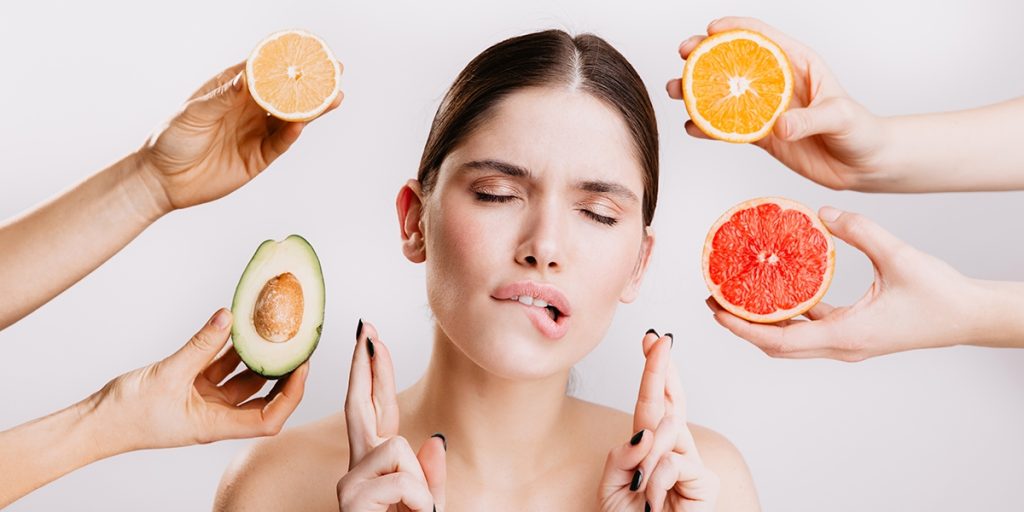Table of Contents
The health of your skin is often a reflection of your overall well-being, and diet plays a crucial role in maintaining its vitality and appearance. What you eat can influence various aspects of skin health, including hydration, elasticity, and clarity. By incorporating a balanced diet rich in essential nutrients, you can support your skin’s natural functions and address common issues such as acne, dryness, and premature aging. This article explores the impact of diet on skin health and offers practical tips for nourishing your skin from the inside out.

Understanding the Link Between Diet and Skin Health
- Nutrient-Rich Foods for Skin
A diet that includes a variety of nutrient-rich foods can have a positive impact on your skin’s health. Essential nutrients, such as vitamins, minerals, and antioxidants, help to maintain skin integrity, promote healing, and combat the effects of aging.
- Vitamins: Vitamins A, C, and E are particularly important for skin health. Vitamin A supports cell turnover and repair, vitamin C aids in collagen production and protects against sun damage, and vitamin E provides antioxidant protection and helps to maintain skin moisture.
- Minerals: Minerals like zinc and selenium play a role in skin health by supporting immune function, reducing inflammation, and protecting against oxidative damage. Zinc is known for its ability to manage acne and promote wound healing, while selenium helps to maintain skin elasticity.
- Antioxidants: Antioxidants, such as flavonoids and carotenoids found in fruits and vegetables, help neutralize free radicals that can cause skin damage and aging. Foods rich in antioxidants help to protect the skin from environmental stressors and support a healthy complexion.
- The Role of Hydration
Adequate hydration is essential for maintaining healthy skin. Drinking enough water helps to keep the skin hydrated, flush out toxins, and support overall skin function. Proper hydration can prevent dryness, improve skin elasticity, and promote a youthful appearance.
- Water: Consuming sufficient water throughout the day is the most straightforward way to maintain skin hydration. Aim for at least eight glasses of water daily, and adjust based on activity level and climate conditions.
- Water-Rich Foods: In addition to drinking water, incorporating water-rich foods into your diet can further support skin hydration. Fruits like watermelon, cucumber, and oranges, as well as vegetables such as lettuce and celery, contribute to overall fluid intake and skin moisture.
Dietary Factors Affecting Skin Health
- Healthy Fats
Healthy fats are crucial for maintaining skin health and appearance. They help to nourish the skin, maintain its barrier function, and reduce inflammation.
- Omega-3 Fatty Acids: Omega-3 fatty acids, found in fatty fish (such as salmon and mackerel), flaxseeds, and walnuts, help to reduce inflammation and support skin hydration. They also help to protect the skin from UV damage and maintain its elasticity.
- Monounsaturated Fats: Monounsaturated fats, found in avocados, olive oil, and nuts, help to maintain skin moisture and prevent dryness. These fats support the skin’s barrier function and contribute to a smooth, supple complexion.
- Limit Processed and Sugary Foods
Processed and sugary foods can negatively impact skin health by contributing to inflammation, insulin resistance, and oxidative stress.
- Sugar: High sugar intake can lead to increased insulin levels and inflammation, which may exacerbate acne and other skin conditions. Limiting sugary snacks and beverages can help to reduce these effects and support clearer skin.
- Processed Foods: Processed foods, which are often high in unhealthy fats, sodium, and artificial additives, can negatively impact skin health. Opting for whole, minimally processed foods ensures that you receive the nutrients necessary for maintaining healthy skin.
- The Impact of Caffeine and Alcohol
Caffeine and alcohol consumption can affect skin health by influencing hydration levels and overall skin appearance.
- Caffeine: Excessive caffeine consumption can lead to dehydration, which may result in dry, dull skin. Moderating your intake of caffeinated beverages and balancing them with water can help to maintain skin hydration.
- Alcohol: Alcohol dehydrates the body and skin, leading to dryness and premature aging. Reducing alcohol consumption and ensuring adequate hydration can help to mitigate these effects and support a healthy complexion.

Tips for a Skin-Healthy Diet
- Incorporate a Variety of Fruits and Vegetables
Aim to include a diverse range of fruits and vegetables in your diet to provide essential vitamins, minerals, and antioxidants. Colorful fruits and vegetables, such as berries, spinach, and bell peppers, offer a range of nutrients that support skin health and protect against damage.
- Choose Whole Grains
Whole grains, such as brown rice, quinoa, and whole-wheat products, provide important nutrients and fiber that support overall health and skin function. Whole grains help to regulate blood sugar levels and reduce inflammation, contributing to clearer, healthier skin.
- Add Lean Proteins
Incorporate lean proteins, such as chicken, turkey, tofu, and legumes, into your diet to support skin repair and regeneration. Proteins are essential for collagen production and tissue repair, which are crucial for maintaining skin elasticity and resilience.
- Enjoy Healthy Snacks
Opt for healthy snacks that contribute to skin health, such as nuts, seeds, yogurt, and fresh fruit. These snacks provide essential nutrients, healthy fats, and hydration, making them a beneficial addition to your diet.
- Monitor Your Diet and Skin Response
Pay attention to how your skin responds to different foods and dietary changes. Keeping a food diary can help you identify any potential triggers for skin issues and adjust your diet accordingly.

Conclusion
A balanced and nutrient-rich diet plays a vital role in maintaining skin health and appearance. By incorporating a variety of fruits, vegetables, healthy fats, and lean proteins into your meals, you can support your skin’s natural functions and address common issues such as dryness, acne, and premature aging. Staying hydrated, limiting processed and sugary foods, and moderating caffeine and alcohol intake further contribute to a healthy complexion. Prioritizing your diet as part of your skincare routine can lead to a healthier, more radiant skin and overall well-being.
